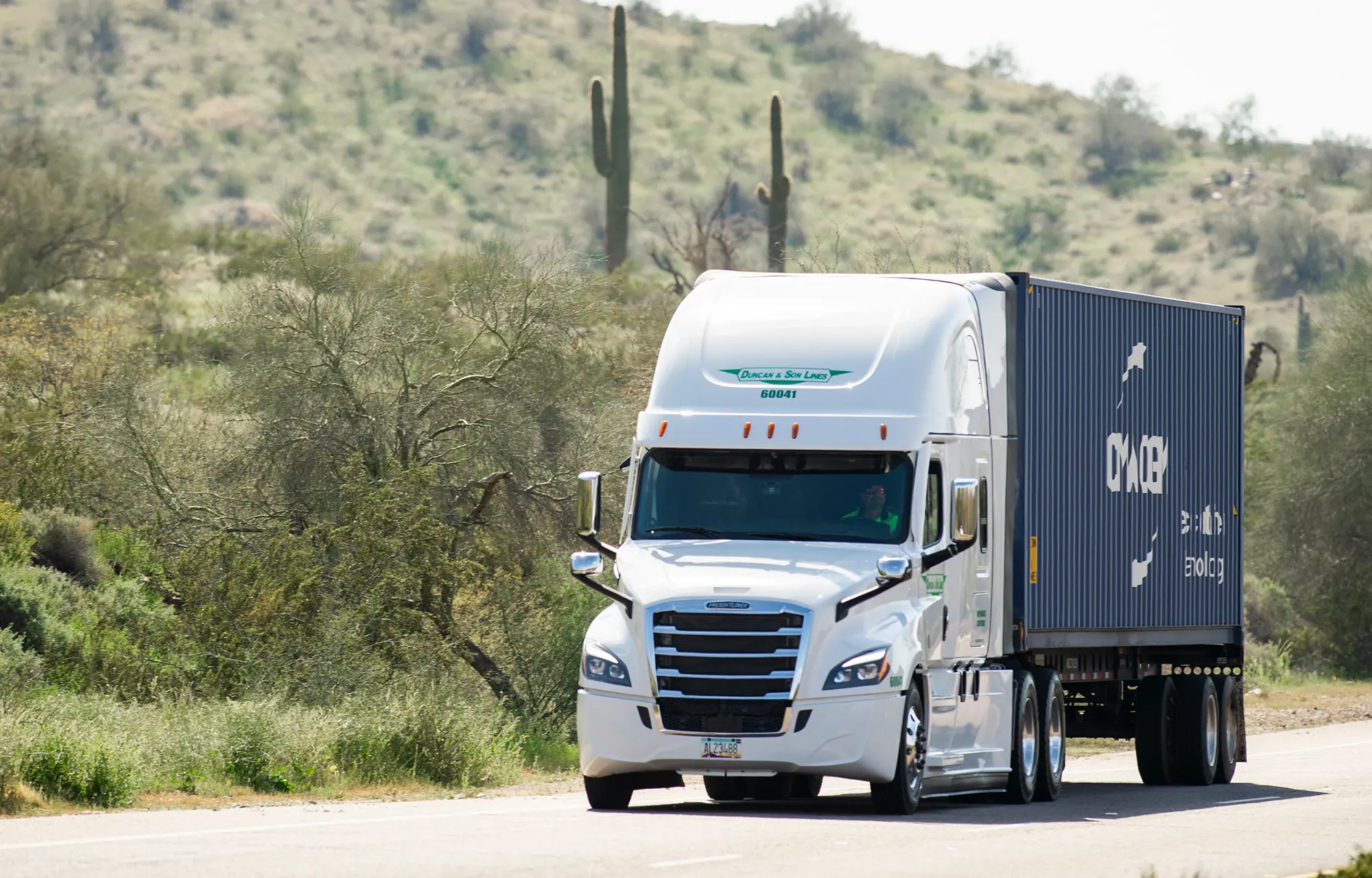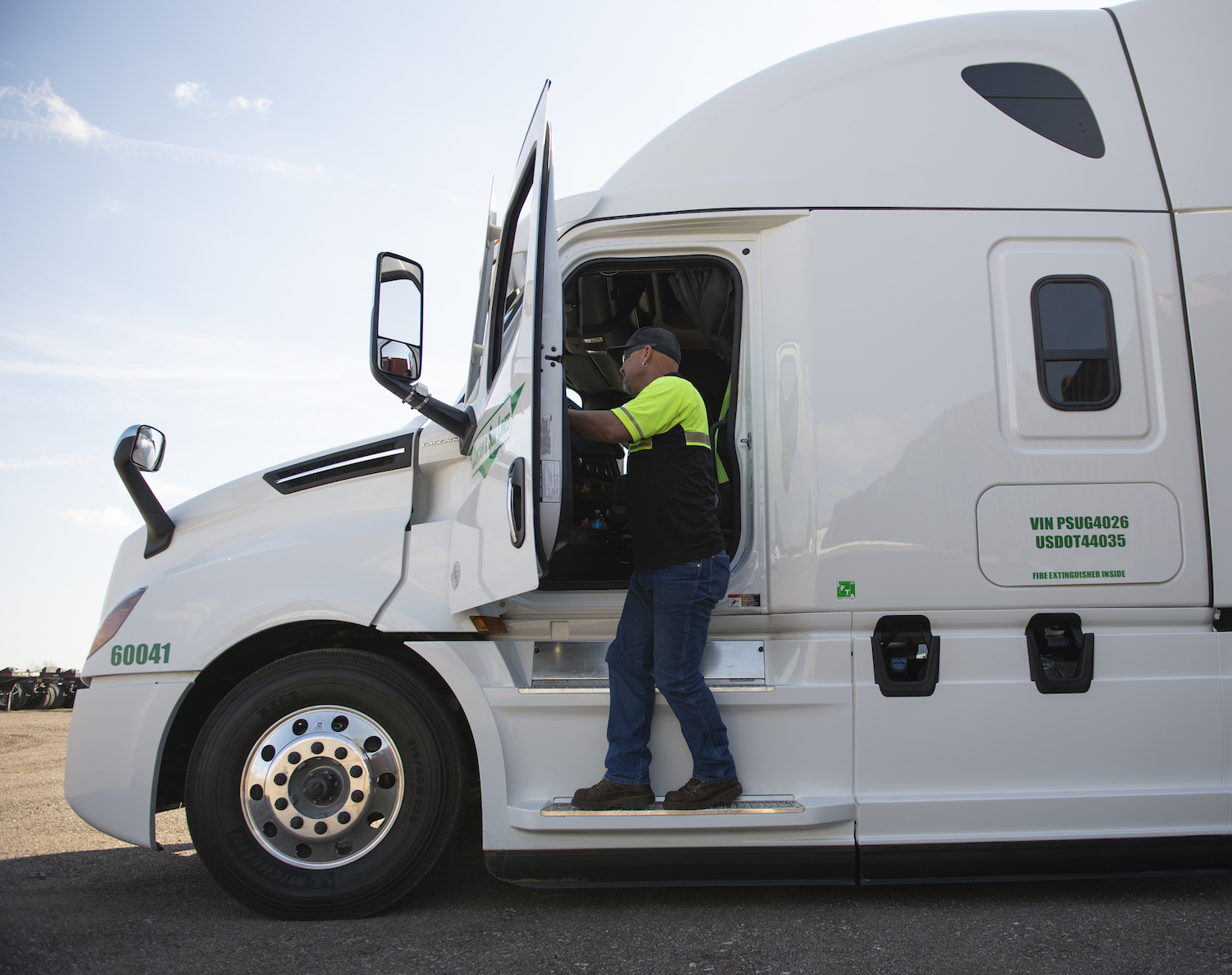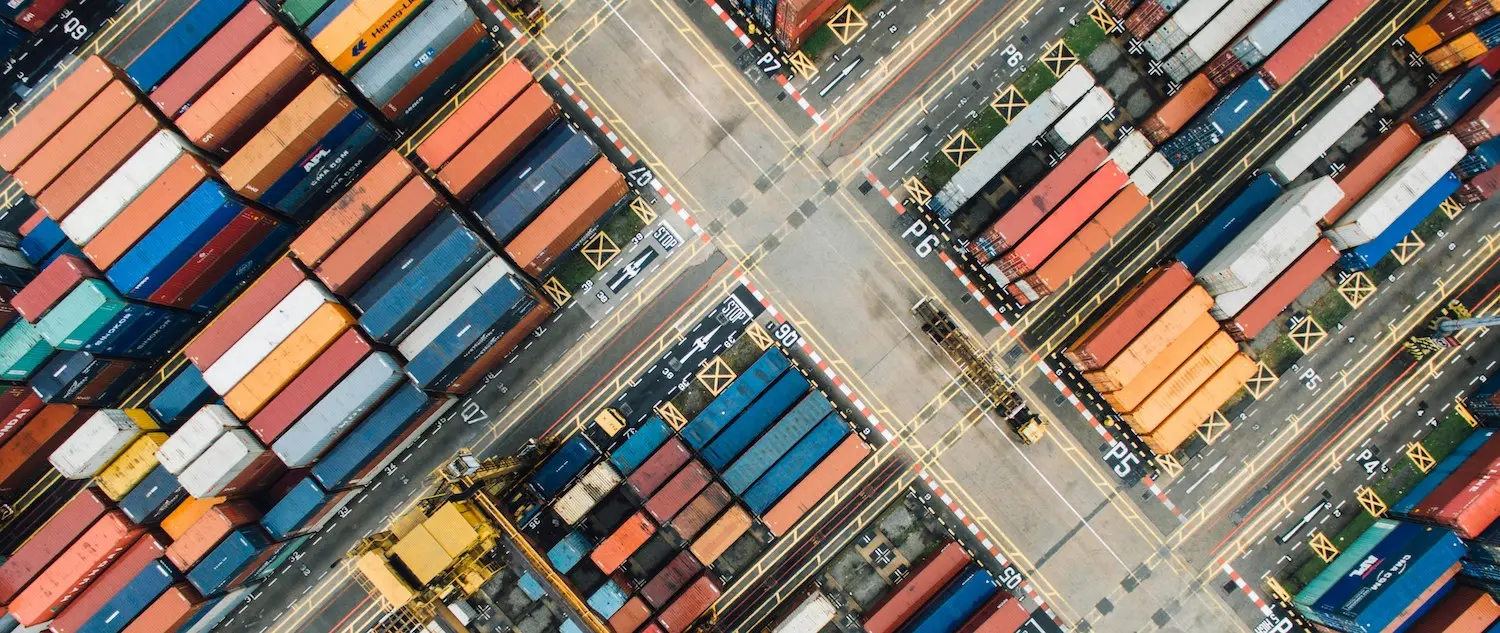
The Intermodal Advantage: Why Businesses Choose Intermodal Trucking
In an era where efficiency, cost-effectiveness, and environmental responsibility dominate the logistics landscape, businesses are gravitating towards a game-changing solution—intermodal trucking.
Intermodal transportation, a seamlessly integrated system encompassing trucks, trains, ships, and more, has become the go-to choice for businesses seeking a competitive edge in freight logistics. This transformative approach unifies diverse modes of transportation into a cohesive network, offering a versatile solution to meet the complex demands of modern supply chains.
In this blog post, we delve into the heart of intermodal trucking, exploring its components, benefits, and the driving forces behind its increasing adoption. From cost-effectiveness to environmental sustainability, businesses are recognizing the intermodal advantage as a strategic move for optimizing their freight operations.
The Benefits of Intermodal Freight Transportation
As businesses thrive on cost-effectiveness, efficiency, and sustainability, intermodal trucking emerges as a transformative solution in freight logistics. This approach seamlessly integrates transport methods, optimizing costs and boosting efficiency, sustainability, and flexibility. In this section, we explore the benefits of intermodal freight transportation and why businesses are strategically shifting to this dynamic logistics solution.
Cost Competitiveness
Fuel Savings and Economies of Scale
Intermodal trucking is a compelling choice for businesses seeking cost competitiveness. By strategically comparing intermodal trucking costs to traditional long-haul trucking, companies can unlock substantial fuel savings and economies of scale. The synergy between trucks, trains, and ships ensures that freight moves efficiently, reducing fuel consumption and overall transportation costs.
Reduced Emissions and Regulatory Compliance
The intermodal advantage extends beyond immediate cost savings. Businesses leveraging this integrated transportation system contribute to long-term cost-effectiveness through reduced emissions and regulatory compliance. Aligning with environmental regulations not only demonstrates corporate responsibility but also mitigates the financial risks associated with non-compliance.
Enhanced Efficiency
Intermodal trucking excels by harnessing the strengths of various transportation modes, resulting in unmatched speed and reliability in freight movement. The seamless transition between trucks, trains, and waterways allows businesses to overcome traditional bottlenecks, minimize congestion, and enhance scheduling. This approach contributes to a highly efficient and streamlined supply chain, where the synergy between different modes of transport ensures swift and dependable cargo deliveries.
Sustainability and Environmental Benefits
A key aspect of intermodal freight transportation is its dedication to sustainability. When we compare the carbon footprint of intermodal with traditional trucking, it becomes clear that the integrated approach of intermodal transportation is more energy-efficient and results in significantly reduced emissions. This aligns perfectly with the increasing demand from environmentally conscious businesses for logistics solutions that prioritize sustainability. In choosing intermodal, businesses not only optimize their supply chain but also contribute to a greener and more eco-friendly future.
Flexibility and Access
Intermodal transportation helps businesses reach more places by smoothly combining trucks, trains, and waterways. Unlike using only trucks on limited routes, intermodal lets companies go to remote or challenging locations, expanding their market and opportunities. Businesses can use intermodal flexibility to adapt their routes for each region’s specific challenges to optimize logistics and meet changing market needs. This makes intermodal transportation a valuable asset for navigating diverse geographical landscapes.
Reduced Reliance on Drivers and Equipment
Driver shortages and a lack of available trucks can create several challenges for businesses. These issues lead to delays, increased competition, and higher costs. Intermodal transportation is a great solution for these challenges—it uses shared rail terminals and port infrastructure, reducing reliance on trucks alone. This collaborative approach optimizes resources and makes the supply chain more resilient. By choosing intermodal, businesses can ease their dependence on a limited number of intermodal truck drivers and vehicles, positioning themselves for a sustainable future in freight transportation.
Automation and Technology Integration
The future of intermodal transport is all about embracing automation and cutting-edge technology. Businesses adopting intermodal solutions position themselves to benefit from these advancements, reducing reliance on manual labor and boosting overall efficiency.
Automation streamlines processes within intermodal networks. From automated scheduling and tracking systems to robotic handling at terminals, businesses can cut costs and improve precision. Integrating technology enables seamless communication and real-time data sharing across different transport modes, creating a more synchronized and responsive supply chain.
Various technologies are set to revolutionize intermodal transport, including AI for optimized route planning, IoT devices for real-time cargo monitoring, and Blockchain for secure and transparent transactions. As businesses explore intermodal solutions, they step into a future where automation and technology converge, shaping a more efficient, connected, and innovative freight transportation ecosystem.
Addressing Concerns and Considerations
As businesses explore the transformative potential of intermodal trucking, it’s crucial to navigate the nuances and address concerns that may arise. In this section, we delve into the limitations, debunk myths, and provide practical guidance to empower businesses considering the adoption of intermodal transportation.
Potential Limitations in Intermodal Freight Shipping
Longer Transit Times
While intermodal trucking excels in optimizing efficiency for many routes, it’s important to acknowledge that certain routes may experience longer transit times. The interplay between various transportation modes, such as trucks, trains, and ships, can introduce complexities that impact delivery schedules. Businesses should carefully assess their specific transportation needs and weigh the trade-offs between transit times and the cost-effectiveness of intermodal solutions.
Increased Complexity in Planning
The integration of multiple modes of transportation introduces a level of complexity in planning that businesses need to consider. Coordinating the schedules of trucks, trains, and ships requires meticulous logistics management. Acknowledging this complexity upfront allows businesses to proactively address planning challenges and implement strategies for seamless coordination across the intermodal network.
Addressing Myths
Lack of Reliability
One common misconception about intermodal trucking is the perception of reduced reliability compared to traditional trucking. In reality, intermodal transportation, when executed with careful planning and reliable partners, can offer equal or even higher levels of reliability. By leveraging the strengths of each transportation mode, businesses can achieve optimized delivery schedules and enhance overall supply chain dependability.
Limited Route Availability
Another myth is the perceived limitation in route availability with intermodal transportation. Contrary to this belief, intermodal networks are expansive and continually evolving. Inland terminals, rail transportation, and waterway access points provide businesses with a vast array of route options. Understanding the breadth of intermodal routes available allows businesses to tap into a network that aligns with their geographic and logistical requirements.
Tips For Success in Intermodal Shipping
Finding Reliable Partners
One key to successful intermodal adoption is forging strong partnerships with reliable logistics providers. Businesses should conduct thorough due diligence when selecting partners, considering factors such as experience, track record, and the ability to seamlessly integrate different transportation modes. A collaborative and communicative relationship with partners ensures a smooth and efficient intermodal operation.
Planning Effectively
Effective planning is paramount in navigating the complexities of intermodal transportation. Businesses should invest time in detailed route planning, considering the specific requirements of each leg of the journey. Leveraging technology solutions for real-time tracking and coordination can enhance planning accuracy and mitigate potential disruptions.
Navigating Regulations
Intermodal transportation involves compliance with a diverse set of regulations governing different modes of transport. Businesses should stay informed about regulatory requirements related to trucking, rail, and maritime transportation. Developing a comprehensive understanding of these regulations ensures that businesses can navigate the legal landscape seamlessly, avoiding delays and compliance issues.
Choosing the Best Intermodal Trucking Company
Selecting the ideal intermodal trucking company requires a meticulous assessment of various factors to ensure a seamless and reliable partnership. Delve deeper into the details, and ask specific questions to make an informed decision that aligns with your business objectives.
Factors to Consider
1. Experience and Reputation:
Ask: How many years has the company been involved in intermodal shipping? What industries have they served?
Consider: Look for a company with a proven track record, particularly in your industry, showcasing their ability to navigate specific logistics challenges.
2. Network and Coverage:
Ask: What is the extent of their intermodal network? Can they provide comprehensive coverage for your shipping lanes?
Consider: Evaluate the geographical reach of their network, ensuring it aligns with your business’s distribution and supply chain requirements.
3. Equipment and Technology:
Ask: What types of trucks, intermodal containers, and technology do they utilize for intermodal shipments? How do they stay updated with industry advancements?
Consider: Opt for a company with a modern fleet equipped with advanced technology for real-time tracking, route optimization, and efficient communication.
4. Reliability and On-Time Performance:
Ask: What is their track record for on-time deliveries and overall reliability? How do they handle disruptions or unexpected challenges?
Consider: Examine their historical performance data, and inquire about contingency plans in place to mitigate delays and ensure consistent service.
5. Safety and Compliance:
Ask: How does the company prioritize safety, and what measures do they have in place to ensure compliance with industry regulations?
Consider: Check for safety certifications, compliance with regulations, and a commitment to industry best practices to safeguard your cargo.
6. Cost Transparency and Billing Practices:
Ask: How transparent are they about costs? Can they provide a breakdown of fees and charges associated with their services?
Consider: Select a company that offers clear and transparent pricing structures, avoiding unexpected financial surprises.
7. Customization and Flexibility:
Ask: Can they tailor their services to meet your specific logistics requirements? How flexible are they in accommodating changing needs?
Consider: Choose a company that values adaptability, allowing for customization to address the unique demands of your business.
8. Insurance Coverage:
Ask: What insurance coverage do they provide for cargo in transit? How do they handle claims in case of damage or loss?
Consider: Ensure that the company has robust insurance coverage and clear procedures for handling claims, providing financial protection for your cargo.
9. Customer Service and Communication:
Ask: How responsive and communicative is their customer service team? What communication channels do they use?
Consider: Opt for a company that prioritizes clear communication, offers responsive customer support, and keeps you informed throughout the shipping process.
Key Questions to Ask:
1. Can You Provide References?
Request references from current or previous clients in your industry to gain insights into their experiences and satisfaction levels.
2. What Safety Measures Are in Place?
Inquire about their safety protocols, ongoing training programs for intermodal truck drivers, and any technologies used to enhance overall safety during transportation.
3. How Do You Handle Unexpected Delays or Issues?
Understand their approach to handling unexpected challenges, delays, and how they communicate with clients during such situations.
4. What Technology Platforms Do You Use for Tracking and Visibility?
Get details on the technology platforms they use for real-time tracking, visibility, and communication throughout the transportation process.
5. Are You Familiar with Regulations in the Regions You Operate?
Ensure that the intermodal trucking companies you talk to are well-versed in the regulations governing the regions they operate in to avoid compliance issues.
6. What is Your Contingency Plan for Unforeseen Events?
Inquire about their contingency plans for unforeseen events, adverse weather conditions, or other disruptions that may impact transportation.
7. How Often Do You Maintain and Upgrade Your Fleet?
Understand the frequency of fleet maintenance and upgrades to ensure the reliability and efficiency of their freight containers and trucks.
8. Can You Provide a Detailed Service Agreement?
Request a comprehensive service agreement that outlines all terms, conditions, and expectations to avoid misunderstandings later on.
9. What is Your Approach to Sustainability and Environmental Practices?
Inquire about their commitment to sustainability, including fuel-efficient practices, alternative fuels, and any green initiatives in place.
10. How Do You Ensure Secure Handling of Sensitive Cargo?
If you deal with sensitive or specialized cargo, ask about their protocols and measures in place to ensure secure handling and transportation.
Choosing the best intermodal trucking company involves thorough research, scrutiny, and open communication. By incorporating these considerations and questions into your evaluation process, you can establish a partnership that not only meets your current logistics needs but also grows with your business. Remember that the right intermodal trucking company should align with your goals, provide transparency, and deliver consistent, high-quality service.

Future Trends
In the ever-evolving landscape of freight logistics, the future of intermodal transportation is marked by a convergence of innovative trends and anticipated advancements. Let’s delve deeper into the intricate details of the emerging trends and technological breakthroughs that are set to shape the trajectory of intermodal trucking.
Emerging Trends in Intermodal Transportation
1. Digital Integration and IoT
The integration of digital technologies and the Internet of Things (IoT) is transforming intermodal transportation into a connected and intelligent network. Smart sensors, RFID technology, and advanced data analytics will enable real-time monitoring and management of shipments. This interconnected ecosystem ensures proactive problem-solving, predictive maintenance, and a higher level of visibility across the supply chain.
2. Blockchain for Enhanced Security
Blockchain technology is poised to revolutionize the security and transparency of intermodal transactions. By creating a decentralized and tamper-proof ledger, blockchain ensures the integrity of data, reducing the risk of fraud and enhancing trust among stakeholders. Smart contracts within the blockchain framework will automate contractual agreements, streamlining transactions and reducing administrative overhead.
3. Modal Integration for Seamless Transitions
The future of intermodal transportation will witness a seamless integration of different transportation modes. Enhanced coordination and synchronization between trucks, trains, and ships will minimize the friction points in transitions, leading to more fluid and efficient intermodal networks. This integration will not only reduce dwell times but also optimize the use of each mode, contributing to overall cost-effectiveness.
4. Sustainable Practices and Green Innovations
Sustainability will be a driving force in the future of intermodal transportation. The industry is actively exploring green innovations, from electric and hydrogen-powered vehicles to eco-friendly terminal operations. As environmental consciousness grows, businesses adopting intermodal solutions will benefit from a reduced carbon footprint, aligning with global efforts to create a more sustainable and responsible logistics ecosystem.
Anticipated Advancements Shaping the Future of Intermodal Trucking
1. Autonomous Vehicles and Automation
Advancements in autonomous vehicles are set to revolutionize intermodal trucking. Autonomous trucks, trains, and ships will not only address concerns related to intermodal truck driver shortages but also enhance safety and efficiency in freight transportation. Automated systems will optimize routes, minimize delays, and reduce operational costs, making autonomous intermodal transport a key player in the logistics landscape.
2. Predictive Analytics for Dynamic Planning
The integration of predictive analytics will empower businesses with dynamic planning capabilities. By analyzing historical data, weather patterns, and market trends, intermodal operators can anticipate disruptions and proactively adjust routes in real-time. This foresight ensures that businesses can navigate the logistics landscape with agility, responding swiftly to changing conditions and minimizing the impact of unforeseen challenges.
3. Global Connectivity and Trade Routes
The future of intermodal transportation promises increased global connectivity. Emerging trade routes and optimized existing ones will create a more interconnected world. Businesses will have greater flexibility in choosing diverse routes, reducing dependence on specific corridors, and adapting to evolving geopolitical and economic landscapes. This expanded connectivity will open new avenues for international trade and global supply chain optimization.
4. Collaborative Ecosystems and Multi-Modal Hubs
Intermodal ecosystems of the future will thrive on collaboration. Multi-modal hubs, where different transportation modes converge seamlessly, will become epicenters of efficiency. Collaborative partnerships between intermodal providers, terminal operators, and technology firms will create an interconnected network that streamlines operations. This collaborative approach ensures end-to-end solutions, fostering a more efficient and resilient intermodal shipping process.
Final Thoughts
In wrapping up, intermodal trucking is gaining popularity for good reasons. It’s a cost-effective, efficient, and sustainable solution that businesses find appealing. Looking ahead, the future of intermodal transportation is bright, with technology and a commitment to sustainability driving positive changes.
We encourage businesses to explore the benefits of intermodal trucking. It’s not just a logistics option; it’s a strategic approach that reduces costs, promotes sustainability, and adapts to a changing supply chain. By incorporating an intermodal transportation process, businesses can thrive in a dynamic and competitive market.
In a nutshell, consider intermodal trucking as a pathway to a more efficient, sustainable, and competitive future in freight logistics. Explore the possibilities, and discover how intermodal can enhance your business strategies.
Categories
- Intermodal



